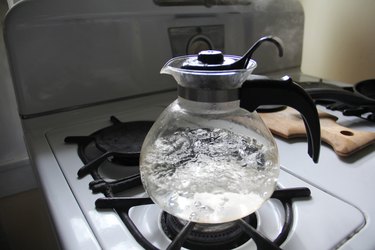
Fitness models often go on a distilled water diet before competitions to reduce their sodium intake and lose water weight. Unlike regular water, distilled water contains no sodium and other minerals. It's also free of contaminants, such as heavy metals and disease-causing bacteria.
Tip
Distilled water contains no minerals and trace elements. One way to increase its mineral content is to mix it with electrolyte powder, drops or effervescent tablets containing magnesium, calcium, sodium and potassium.
Video of the Day
Is Distilled Water Healthy?
Most types of water, including natural spring water and tap water, contain trace elements, minerals and inorganic compounds. Generic bottled water, for example, provides about 24 milligrams of calcium, 5 milligrams of sodium and 5 milligrams of magnesium per cup. Tap water has around 7 milligrams of calcium, 2 milligrams of iron and 9 milligrams of sodium per cup, depending on the source.
Video of the Day
Distilled water contains none of these minerals. Think of it as the purest type of water out there. It's free of harmful bacteria, viruses, fungi, sulfate, lead and other contaminants. For this reason, it is widely used in hospital settings, dental offices and labs.
This ultra-pure fluid is produced by boiling regular water and then collecting the condensed steam in a sterile container. The distillation process destroys germs in the water and removes impurities, such as salts and heavy metals, reports the Department of Homeland Security. Boiling and chlorination, by contrast, kill bacteria but fail to remove other contaminants.
Distilled water contains no impurities and therefore is considered safe. The only downside is its flat taste, because minerals are added to water for taste and since distilled water contains none, it has no flavor. Additionally, it can be difficult to produce at home because most distillation devices come with a high price tag, note the experts at Purdue University. In fact, it might be cheaper to purchase bottled distilled water than prepare it at home.
Minerals for Distilled Water
This beverage doesn't contain any minerals. However, you can increase its mineral content in a few ways. For example, you may add electrolyte powder or tablets, effervescent multivitamins and minerals or natural ingredients like salt and fresh fruit juice.
Some of the best minerals for distilled water include calcium, magnesium, potassium, sodium, zinc and iron. The first four are electrolytes, helping restore your fluid balance. These nutrients support the proper functioning of your brain, heart and muscles, aid in nutrient transportation and regulate your body's pH levels, according to the U.S. National Library of Medicine.
For example, if you're struggling with severe diarrhea or vomiting, you may develop electrolyte imbalances. This can also happen when you work out harder than usual. Your body will lose water and electrolytes through sweat and urine. One way to bring your electrolyte levels back into balance is to add sodium, magnesium and other nutrients to distilled water.
Electrolyte formulas come in tablet, liquid or powder form, so they can be easily added to water. You may also use mineral supplements — simply crush them and mix them with distilled water or use effervescent tablets. The National Institutes of Health states that multivitamin/mineral supplements make it easier to meet your daily nutrient intake and prevent deficiencies. Their composition varies from one brand to the next, so it's important to check the labels.
Are There Any Health Benefits?
Like regular water, distilled water supports overall health and wellbeing by keeping you hydrated. Plus, it's free of bacteria and heavy metals, making it ideal for wound cleansing. According to the National Cancer Institute, distilled water may destroy bladder cancer cells. These effects were observed in vitro (a controlled lab environment), so it's unclear how they relate to humans, however.
A potential advantage of distilled water is its low sodium content. When consumed in excess, this mineral may raise blood pressure and promote water retention by increasing extracellular fluid volume. Regular water does contain sodium — but too little to affect your blood pressure or your waistline.
The human body needs sodium to function optimally. Along with potassium, this mineral regulates blood pressure and supports bone health. It also plays a role in energy metabolism and kidney function, as Harvard Health Publishing points out. Just make sure you consume it in moderation.
Distilled water is just as hydrating as regular water. Plus, it has zero calories. Bottled water, on the other hand, provides more minerals and electrolytes, but it may also contain bacteria and impurities. Stay on the safe side and consult your doctor before switching to a distilled water diet.
- USDA: "Generic Bottled Water"
- USDA: "Tap Water"
- Department of Homeland Security: "Water"
- Purdue University: "Distillation for Home Water Treatment"
- Medline Plus: "Fluid and Electrolyte Balance"
- Roswell Park: "Electrolytes — What Are They? What Happens If You Don't Have Enough?"
- NIH: "Multivitamin/Mineral Supplements"
- NCBI: "Water for Wound Cleansing"
- National Cancer Institute: "Distilled Water"
- AJDK: "An Increasingly Complex Relationship Between Salt and Water"
- Harvard.edu: "Potassium and Sodium Out of Balance"